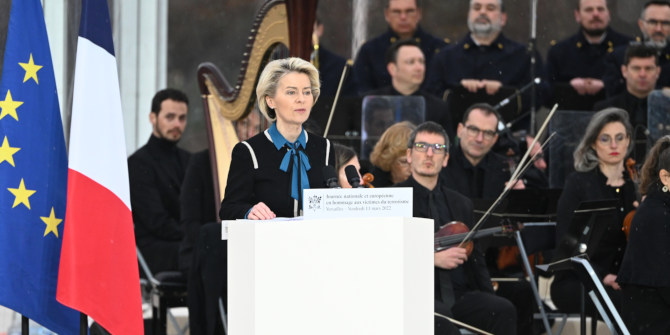In light of the EU’s lack of unity over how to approach Russia, the Council for the Baltic Sea States (CBSS), which includes Russia as a member, provides an important supplementary diplomatic forum for regional diplomacy in Europe. Stefan Gänzle argues the new Norwegian presidency of the CBSS offers a potential platform for establishing a dialogue between Russia and other European countries.
On 1 July this year, Lithuania passed the presidency of the Council of the Baltic Sea States to Norway. In the words of Ine Eriksen Søreide, at the occasion of the ministerial meeting on 1 June, the Norwegian one-year presidency intends to focus on green transformations – the so-called European Green Deal – with the goal of turning the Baltic Sea Region into an innovation hub for sustainability. It will also aim to find new ways to engage young people as well as maintain safety in the region by continuing to work on anti-trafficking and children’s rights and strengthening the fight against organised crime and cybercrime.
Soft security
Since February 1992, the CBSS has regularly brought together the nine countries bordering the Baltic Sea as well as countries – such as Norway and Iceland (the latter since 1996) – that are part of the wider region. For Norway, membership in the CBSS has provided an opportunity to contribute to the peaceful development of a region at its doorstep.
The CBSS was founded – on a joint initiative by Denmark and Germany – in the immediate aftermath of the collapse of communism and quickly became a model for similar diplomatic endeavours in the region, such as the Barents-Euro-Arctic Council and the Arctic Council – in which Norway is strongly engaged. Originally established as a platform for intergovernmental cooperation, the CBSS pursued three core objectives at the time.
First, it attempted to provide channels of communication for several Baltic Sea region countries that had become either newly independent or were keen on restoring their diplomatic ties. Second, it focused on contributing to the solution of concrete post-Soviet challenges. Most prominently, the case of the Russia-speaking minorities that had migrated to Estonia and Latvia after these countries had been incorporated into the Soviet Union during the Second World War. Even though questions related to this issue continue to make headlines, the Council – like the EU – has addressed these problems in a collaborative way. Third, the Council was a diplomatic training exercise for the Baltic states, well before EU and NATO membership were imaginable.
These days have gone. EU and NATO enlargement have significantly altered the geopolitical landscape of the Baltic Sea region over the past twenty years. So has Russia’s annexation of Crimea and her subsequent involvement in the war in Eastern Ukraine.
In terms of tasks, the CBSS has increasingly focused on projects of functional as well as need-based cooperation, leaving hard politics outside its orbit. In its most recent Vilnius II declaration, it emphasises the importance of cooperation across borders to combat the consequences of the Covid-19 pandemic, promote further digitalisation, and improve the education and training of young people. Whereas the CBSS started with a rather broad portfolio of tasks, its mandate has been subsequently refined to focus on measures to support the development of a regional identity, improve safety and security, and establish a sustainable and prosperous region.
The return of ‘hard’ security since 2014
Sweden and Finland are not members of NATO. However, they have both started to consider pursuing closer relations since Russia’s intervention in Ukraine. Estonia, Latvia and Lithuania – in addition to being NATO members – are also bound to reorient themselves towards an exclusively Nordic framework of collaboration, such as the Nordic-Baltic Eight group.
EU-spurred initiatives aimed at keeping the Russian Federation involved in processes of international collaboration in the region have not triggered the aspired results, and, overall, the bilateral relationship is characterised by mutual distrust. Initiatives such as Nord Stream 2 have also failed to be framed as topics of mutual interest for countries in the region – and have instead been left at a strictly bilateral level, between Germany and Russia in this case.
Against this backdrop, the Council of the Baltic Sea States has been strengthened in terms of its capacity to handle small-scale projects that broadly fall in the realm of its core objectives. Over the past few years, the CBSS has acquired some confidence in managing various projects either supported at the regional level of its members or by the European Union. Russia has always emphasised how important it is to maintain the autonomy of the CBSS, something that the Norwegian presidency may be in a position to live up to.
As a matter of fact, the CBSS is for the time being one of the very few organisations where Russia and other European countries effectively speak to one another. While meetings between heads of state and government have been frozen since 2014, the CBSS has still been flexible enough to convene political meetings between ministries, which have taken place nearly every year, though no formal ministerial councils have been organised. The Icelandic presidency of 2017 – in the year celebrating the 25th anniversary of the Council – offered initiatives to help normalise relations with Russia. The Norwegian presidency – as a close partner of the EU but a non-EU member – is very well placed to support similar steps, provided that Russia is willing to return them.
Note: This article gives the views of the author, not the position of EUROPP – European Politics and Policy or the London School of Economics. Featured image credit: CBSS Secretariat (CC BY 2.0)






Stefan Gänzle provides an interesting and concise historic and temporary account of the CBSS against the background of Norway recently resuming the one-year chairmanship of the body with many valid and good points. There are a few items though which I perceive a little bit differently. While I overall agree that the three objectives of the CBSS he lists as “core” were important in the work of the organization especially during the 1990s, this focus on the newly independent countries and the former Soviet Union seems to be somewhat narrow from my point of view as the CBSS’s scope was to cover the entire Baltic Sea region and relations and communication among all its countries. The founding declaration of the CBSS in 1992 stated that the overall goal of the CBSS was to strengthen the cohesion among all Baltic Sea littoral countries, “leading to greater political and economic stability as well as a regional identity”. The Declaration further listed those areas to which hereby special attention should be paid: assistance to new democratic institutions, economic and technological assistance and cooperation, humanitarian matters and health, protection of the environment and energy, cooperation in the fields of culture, education, tourism and information, and transport and communication. Or as the CBSS’ founding fathers Hans-Dietrich Genscher and Uffe Ellemann-Jensen stated at the 10th anniversary of the CBSS in 2002, “in light of political changes in Europe, the dream was to create a forum, which could serve as a driving force behind political and economic stabilisation and co-operation in the new Baltic Sea region”, taking into account that also most of the Western states of the region faced several major political and economic changes and challenges during the 1990s.
Further, while it is absolutely correct that the CBSS focusses on the three by Gänzle listed priority areas since 2014, I still think that its portfolio has remained rather broad as these topics are mainly headlines for a much bigger number of (sub-)issues. The old question whether the CBSS’s portfolio is actually not too big remains and there are a few who argue for even more specialization and focus.
Finally, Gänzle leaves out a bit that between the Icelandic Presidency in 2017 and today more has happened in order to restore and improve relations between Russia and all other member states within the framework of the Council. His last two sentences could give the impression that nothing has happened in this respect since 2017 and that Norway should now pick up from Iceland. Indeed while there were no formal high level meetings between 2014 and 2017, since 2017 a meeting of foreign ministers or replacing high level officials has taken place even every year, first indeed labelled as more informal “high level” meetings only but since 2020, if I am not mistaken, again as official “ministerial” or at least more formal meetings. In this time, the ministers even decided on a number of reforms for the CBSS prepared by a Vision Group of Wise persons all with the full involvement and participation of Russia. The 2020 meeting was even attended by the foreign ministers of all eleven member states including Russian FM Sergey Lavrov, something that happened very rarely even in more normal times before 2014 and was probably due to the fact that the meeting was held digitally for the first because of the pandemic. Thus it largely seems that while of course the overall political relations between Russia and the West are still far from good and normal, the working relations within the CBSS have come at least somewhat closer to normality again. It would have been very interesting to read more about what Gänzle exactly has in mind as to what Norway could do, or even will do, in order to further help normalize relations with Russia within the CBSS framework.
Dr Tobias Etzold, NTNU Trondheim